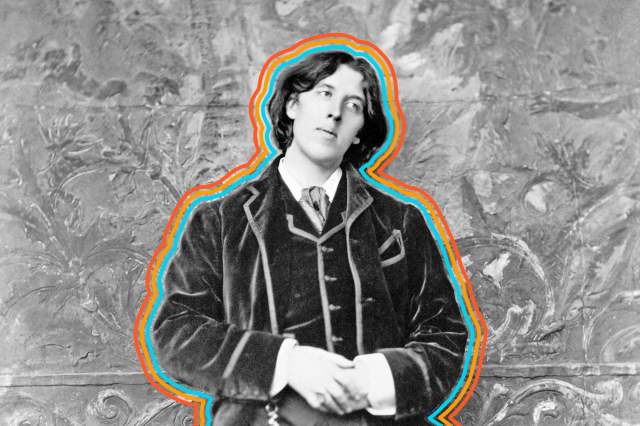
Wilde Was the Son of Famous Parents
The Wilde name was well-known before Oscar made his mark. His father, Sir William Wilde, was an acclaimed otolaryngologist (ear, nose, and throat doctor) and ophthalmologist, who wrote significant works on medicine, archaeology, and folklore. His mother, Jane Wilde, was a poet and activist, known for her support of the Irish nationalist movement and women’s rights. As Wilde wrote in “De Profundis” (a letter he wrote from the Reading Gaol prison), “She and my father had bequeathed me a name they had made noble and honored not merely in literature, art, archaeology and science, but in the public history of my own country in its evolution as a nation.”

One of Wilde’s Early Poems Was in Memory of His Dead Sister
When Wilde was 12 years old, his little sister, Isola, died of meningitis. He was deeply affected by her death, and later wrote a poem in her memory called “Requiescat.” It’s a beautiful, lyrical poem, in which Isola seems to be at once dead and alive: “Tread lightly, she is near / Under the snow, / Speak gently, she can hear / The daisies grow.”

Wilde Lost His Irish Accent at Oxford …
J.E.C. Bodley, a friend of the young Wilde during his Oxford University days, said Wilde was “naïve, embarrassed, with a convulsive laugh, a lisp, and an Irish accent.” But Wilde adjusted to life at Oxford, and became a brilliant student. He also lost his accent, stating later in life that “my Irish accent was one of the many things I forgot at Oxford.” Wilde’s voice in later life was described by the actor Franklin Dyall as “of the brown velvet order — mellifluous — rounded — in a sense giving it a plummy quality” and “practically pure cello.” Unfortunately, a recording of Wilde reading “The Ballad of Reading Gaol” turned out to be a fake, and no other recordings are known to exist.
More Interesting Reads

… But He Was Always Irish In His Heart
While some of Wilde’s works can be described as quintessentially “English” plays, Wilde himself never abandoned his Irish roots. When public performances of his play Salomé were banned in Britain — on the basis of it being illegal to depict biblical characters on the stage — Wilde hit back in an interview, saying “I shall leave England and settle in France, where I will take out letters of naturalization. I will not consent to call myself a citizen of a country that shows such narrowness in its artistic judgment.” He then added, “I am not English; I’m Irish — which is quite another thing.”

Wilde Fell in Love With a Woman Who Later Married Bram Stoker
In his early twenties, Wilde became besotted with a beautiful young woman called Florence Balcombe. When they first met, he told a friend, “I am just going out to bring an exquisitely pretty girl to afternoon service in the Cathedral. She is just seventeen with the most perfectly beautiful face I ever saw and not a sixpence of money.” They dated for months, but distance put a strain on their relationship. Then Florence met Bram Stoker, who would later go on to write Dracula. They married, and Wilde was devastated. He wrote Florence a letter in which he called their time together “two sweet years — the sweetest of all the years of my youth.” They remained friends for years after.

Oscar Wilde Was Married And Had Children
Due to Wilde’s well-documented relationships with men, people often don’t realize that he was married and had two children. Wilde married Constance Lloyd, an Irish author, in London in 1884. During their first two years of marriage they had two sons together, Cyril and Vyvyan. No one knows when Constance became aware of Oscar’s relations with men, but she met his lover, Lord Alfred Douglas, in 1891. The ensuing scandal and Wilde’s imprisonment placed a great strain on their relationship. Constance changed her surname and moved to Switzerland. She died in 1898, and Oscar never saw his two sons again.

Wilde First Filed the Suit of Libel That Would Be His Undoing
Wilde met Lord Alfred “Bosie” Douglas, who was 16 years his junior, in 1891. The two soon became lovers. Douglas was the third son of the Marquess of Queensberry, famous for creating the Queensberry Rules of boxing. When Queensberry found out about his son’s relationship, he tried to end it in various ways. At one point he left a card for Wilde, which simply said “For Oscar Wilde, posing sodomite.” This prompted Wilde to prosecute Queensberry for libel. It backfired terribly, and Wilde himself ended up in court on multiple charges of gross indecency. He was found guilty and sentenced to two years hard labor. All this occurred at the height of his fame and success, while The Importance of Being Earnest was still being performed in London. After his conviction, Wilde’s life was never the same.

Oscar Wilde Retained His Legendary Wit to the Very End
Wilde spent his last three years impoverished and in exile in France. Some of his closest friends visited him and stayed with him to the end, as Oscar faded away in a dingy hotel in Paris. He was a broken man, but his wit could not be destroyed. As he lay looking at the surroundings of his cheap hotel room, he uttered some of his final words: “My wallpaper and I are fighting a duel to the death. One or the other of us has to go.” It was classic Oscar Wilde, and the quote is often listed among the greatest last words ever spoken.

Wilde Was Posthumously Pardoned in 2017
Wilde feared that he had ruined his family name. In his letter “De Profundis,” he wrote: “I had disgraced that name [Wilde] eternally. I had made it a low byword among low people. I had dragged it through the very mire.” But Wilde, on this occasion, was wrong: His name would not be disgraced eternally, although it did take more than a century for an official annulment of his conviction.
In 2017, Wilde was one of some 75,000 gay men in England and Wales pardoned by Queen Elizabeth II. All of these men had been convicted for now-abolished sex offences. This royal pardon is informally known as the Turing Law, named after Alan Turing, the World War II codebreaker who, like Wilde, was convicted for his gay relationships. Turing was officially pardoned in 2013, 61 years later.
Today, Wilde is still remembered for his exuberant lifestyle and infamous imprisonment as much as for his work. Nonetheless, The Picture of Dorian Gray and The Importance of Being Earnest are still considered great literary masterpieces of the late Victorian period, and both display Wilde’s indomitable wit and consummate eye for beauty.












